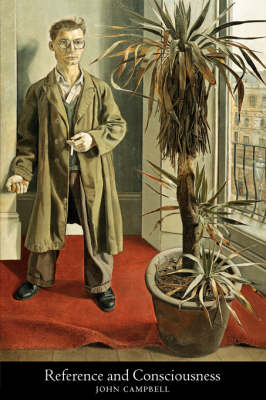
Reference and Consciousness
Seiten
2002
Oxford University Press (Verlag)
978-0-19-924381-5 (ISBN)
Oxford University Press (Verlag)
978-0-19-924381-5 (ISBN)
Investigates how consciousness of the world explains our ability to think about the world. This work illuminates classical problems about thought, reference, and experience by looking at the underlying psychological mechanisms on which conscious attention depends.
What explains our ability to refer to the objects we perceive? John Campbell argues that our capacity for reference is explained by our capacity to attend selectively to the objects of which we are aware; that this capacity for conscious attention to a perceived object is what provides us with our knowledge of reference. When someone makes a reference to a perceived object, your knowledge of which thing they are talking about is constituted by your consciously attending to the relevant object. Campbell articulates the connections between these three concepts: reference, attention and consciousness. He looks at the metaphysical conception of the environment demanded by such an account, and at the demands imposed on our conception of consciousness by the point that consciousness of objects is what explains our capacity to think about them. He argues that empirical work on the binding problem can illuminate our grasp of the way in which we have knowledge of reference, supplied by conscious attention to the relevant object.
Reference and Consciousness illuminates fundamental problems about thought, reference, and experience by looking at the underlying psychological mechanisms on which conscious attention depends. It is an original and stimulating contribution to philosophy and to cognitive science.
The Oxford Cognitive Science Series is a forum for the best contemporary work in this flourishing field, where various disciplines - cognitive psychology, philosophy, linguistics, cognitive neuroscience, and computational theory - join forces in the investigation of thought, awareness, understanding, and associated workings of the mind. Each book will constitute an original contribution to its subject, but will be accessible beyond the ranks of specialists, so as to reach a broad interdisciplinary readership. The series will be carefully shaped and steered with the aim of representing the most important developments in the field and bringing together its constituent disciplines.
General Editors: Martin Davies, James Higginbotham, Philip Johnson-Laird, Christopher Peacocke, Kim Plunkett
What explains our ability to refer to the objects we perceive? John Campbell argues that our capacity for reference is explained by our capacity to attend selectively to the objects of which we are aware; that this capacity for conscious attention to a perceived object is what provides us with our knowledge of reference. When someone makes a reference to a perceived object, your knowledge of which thing they are talking about is constituted by your consciously attending to the relevant object. Campbell articulates the connections between these three concepts: reference, attention and consciousness. He looks at the metaphysical conception of the environment demanded by such an account, and at the demands imposed on our conception of consciousness by the point that consciousness of objects is what explains our capacity to think about them. He argues that empirical work on the binding problem can illuminate our grasp of the way in which we have knowledge of reference, supplied by conscious attention to the relevant object.
Reference and Consciousness illuminates fundamental problems about thought, reference, and experience by looking at the underlying psychological mechanisms on which conscious attention depends. It is an original and stimulating contribution to philosophy and to cognitive science.
The Oxford Cognitive Science Series is a forum for the best contemporary work in this flourishing field, where various disciplines - cognitive psychology, philosophy, linguistics, cognitive neuroscience, and computational theory - join forces in the investigation of thought, awareness, understanding, and associated workings of the mind. Each book will constitute an original contribution to its subject, but will be accessible beyond the ranks of specialists, so as to reach a broad interdisciplinary readership. The series will be carefully shaped and steered with the aim of representing the most important developments in the field and bringing together its constituent disciplines.
General Editors: Martin Davies, James Higginbotham, Philip Johnson-Laird, Christopher Peacocke, Kim Plunkett
John Campbell is Wilde Professor of Mental Philosophy at Oxford University.
Introduction ; 1. Experiential Highlighting ; 2. What is Knowledge of Reference? ; 3. Space and Action ; 4. Sortals ; 5. Sense ; 6. The Relational View of Experience ; 7. The Explanatory Role of Consciousness ; 8. Joint Attention ; 9. Memory Demonstratives ; 10. The Anti-Realist Alternative ; 11. Indeterminacy and Inscrutability ; 12. Dispositional vs. Categorical ; Bibliography ; Index
| Erscheint lt. Verlag | 1.8.2002 |
|---|---|
| Reihe/Serie | Oxford Cognitive Science Series |
| Zusatzinfo | 2 figures |
| Verlagsort | Oxford |
| Sprache | englisch |
| Maße | 157 x 233 mm |
| Gewicht | 405 g |
| Themenwelt | Geisteswissenschaften ► Philosophie ► Erkenntnistheorie / Wissenschaftstheorie |
| Geisteswissenschaften ► Philosophie ► Metaphysik / Ontologie | |
| Geisteswissenschaften ► Philosophie ► Sprachphilosophie | |
| Geisteswissenschaften ► Psychologie ► Allgemeine Psychologie | |
| Geisteswissenschaften ► Psychologie ► Biopsychologie / Neurowissenschaften | |
| Geisteswissenschaften ► Psychologie ► Verhaltenstherapie | |
| ISBN-10 | 0-19-924381-6 / 0199243816 |
| ISBN-13 | 978-0-19-924381-5 / 9780199243815 |
| Zustand | Neuware |
| Haben Sie eine Frage zum Produkt? |
Mehr entdecken
aus dem Bereich
aus dem Bereich
die Grundlegung der modernen Philosophie
Buch | Softcover (2023)
C.H.Beck (Verlag)
18,00 €
Buch | Softcover (2023)
Reclam, Philipp (Verlag)
7,00 €

![Was heißt Denken?. Vorlesung Wintersemester 1951/52. [Was bedeutet das alles?] - Martin Heidegger](/media/113619842)
